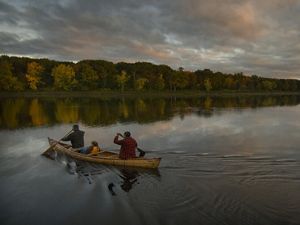TNC Maine is committed to sustained, informed and deliberate work with and in support of Wabanaki people toward shared priorities.
Since time immemorial, Indigenous Peoples have developed and maintained sophisticated knowledge systems and management practices that define their relationships with their homelands. A common principle amongst Indigenous worldviews is the reciprocal relationship between all life—plants, animals and humans—and how we all need each other to carry out our unique roles in order to thrive. Decision-making often considers how the actions taken today will impact the next seven generations, noting the long-lasting effects for people and nature.
The historic and modern practices of conservation have suppressed Indigenous knowledge and authority. This has not only had detrimental effects on Indigenous communities, but also on conservation communities, which have not benefited from the deep knowledge and relationship with the land that Indigenous People have had for millennia. When Indigenous communities have the authority to manage lands and waters, it leads to more sustained conservation and stronger, more vibrant human and natural communities. At The Nature Conservancy in Maine, we recognize that if we are to succeed in our mission to conserve the lands and waters on which all life depends, we must increase tribal decision-making authority, access to lands and waters, and inclusion of Indigenous knowledge in all phases of conservation.
As one of the largest landowners in the State of Maine and as an organization with global capacity, we not only have the opportunity to work with Tribal partners to advance the health of our shared natural world, but we also have the responsibility to do so. By building relationships with Wabanaki people and shifting how we work, TNC in Maine is poised to support real change and accomplish tangible, inclusive and lasting conservation outcomes.
Respect for people, communities and cultures is a core value of The Nature Conservancy. Enduring conservation success depends on the active involvement of people and partners whose lives and livelihoods are linked to the natural systems we seek to conserve. We forge relationships based on mutual support and trust. Our work with Indigenous Peoples is no exception and is furthermore guided by the following principles:
- Trust-building and trustworthiness form the foundation of our work with Indigenous Peoples.
- Our work respects Indigenous rights and reinforces Indigenous Peoples’ efforts towards self-determination and well-being.
- We do not speak for Indigenous Peoples. Working together, we can elevate their voices and priorities and advance our shared goals.
- Our work aims to build rather than burden the capacity of our Indigenous partners.
- Our work aims to restore a reciprocal relationship with nature.
- We approach all this work with persistence and commitment to the time it will require.
TNC Maine is committed to sustained, informed and deliberate work with and in support of Wabanaki people toward shared priorities. This includes increasing Wabanaki access to and use of lands and waters; strengthening authority and self-determination of the Wabanaki Tribes; transforming the definition and practice of conservation by integrating Indigenous knowledge and perspectives; and building competence and capacity to partner with Wabanaki People. We are guided in this work by principles that are rooted in respect and focused on building relationships based on mutual support and trust. We aspire to transform our practice of conservation so that it engages and supports Wabanaki people across all our work, unlocking more robust and sustainable outcomes for nature and the planet.
Download our full Commitment to Collaborating with Indigenous Peoples (PDF).



